Terrace gardening offers a wonderful opportunity to cultivate various plants, from vibrant flowers to delicious fruits and vegetables, not to mention fragrant herbs. To ensure your terrace garden thrives, selecting the right fertilizers is paramount. In this guide, we’ll delve into the world of terrace plant nutrition, providing expert insights on the best fertilizers for different types of plants. Whether you are a seasoned gardener or just starting, our scientifically backed recommendations will help you achieve lush, healthy, and bountiful growth in your terrace garden.
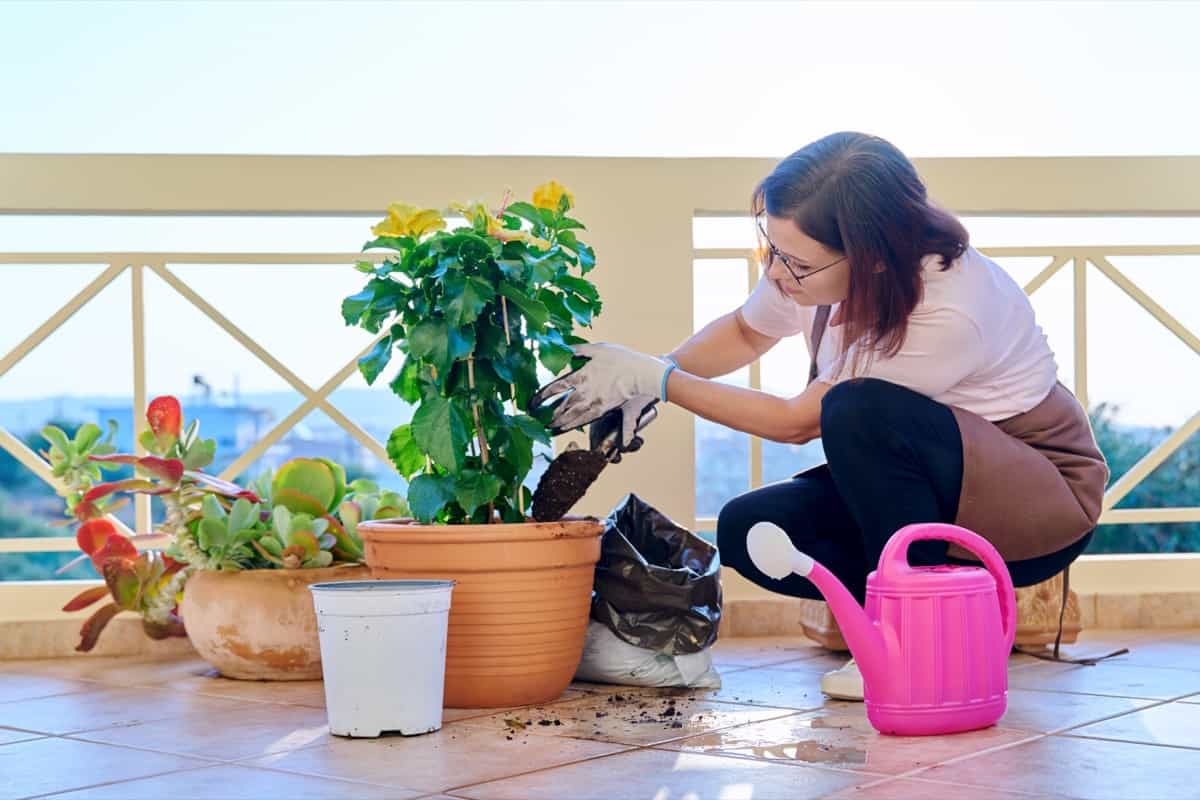
What are Terrace Plants?
Terrace plants or terrace gardens refer to cultivating plants in elevated outdoor spaces, typically on rooftops, balconies, or terraces. These gardens have gained popularity due to limited ground space in urban areas. Terrace gardening allows for a wide range of vegetation, including vegetables, fruits, flowers, and herbs.
They offer numerous benefits, such as improved air quality, temperature regulation, and aesthetic appeal. The accurate data reveals that terrace gardens can reduce indoor temperatures by up to 6°C, conserve energy, and enhance urban biodiversity. They contribute to sustainable urban living, promoting a healthier environment and fostering self-sufficiency in food production.
Why is NPK Important for Plants?
- Nitrogen (N): Nitrogen is vital for leafy green growth and plant vigor. It is a key component of chlorophyll, which is essential for photosynthesis. Without sufficient nitrogen, plants may exhibit stunted growth, yellowing leaves (a condition known as chlorosis), and reduced overall vitality.
- Phosphorus: Phosphorus for root development, flowering, and fruiting. It plays a role in transfer within the plant, converting sunlight into energy. Inadequate phosphorus can lead to poor root growth, fewer blooms, and reduced fruit and seed production.
- Potassium (K): Potassium is involved in various physiological processes, including water uptake, enzyme activation, and disease resistance. It helps plants endure stress, regulate water balance, and develop sturdy cell walls. A lack of potassium can cause weak stems, poor drought tolerance, and increased susceptibility to pests and diseases.
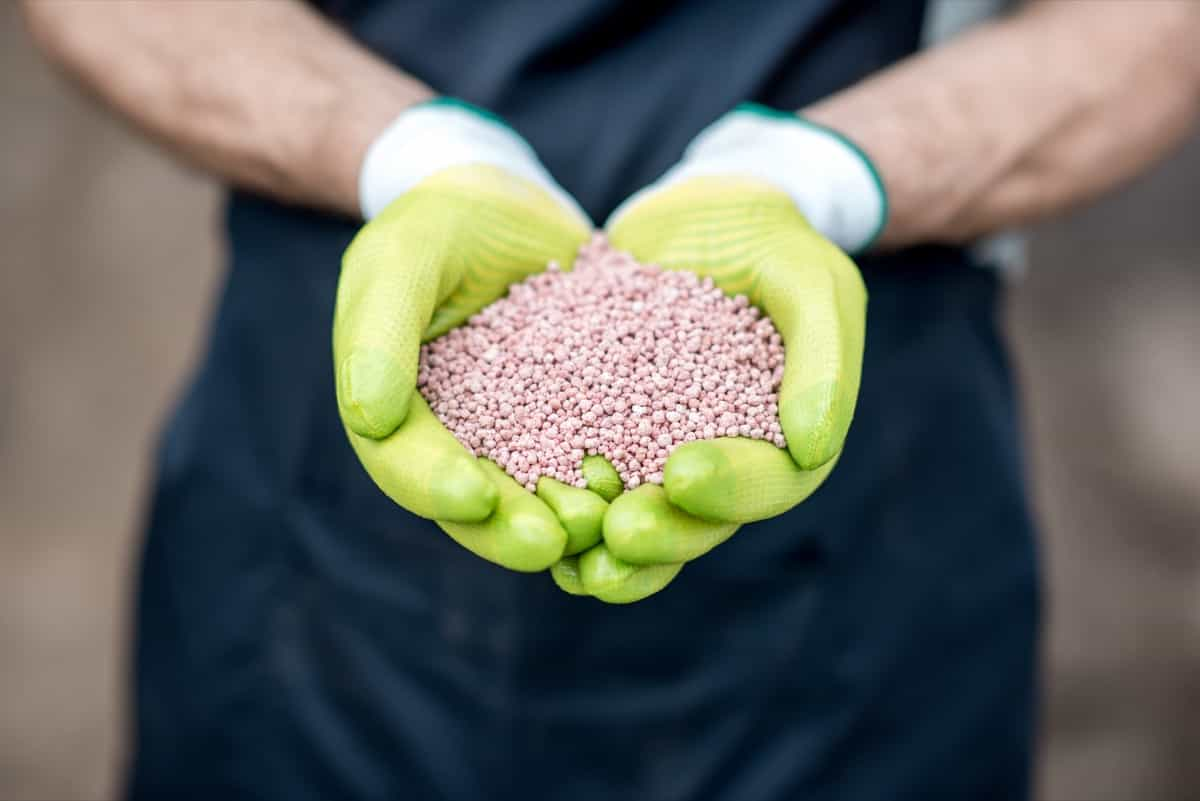
A balanced fertilizer, like a 10-10-10 blend, provides equal proportions of NPK and is suitable for general use. However, targeted fertilizers with higher concentrations of specific nutrients may be necessary for certain crops or soil conditions. For example, plants in a vegetable garden might benefit from a higher nitrogen content for lush foliage.
Benefits of Terrace Garden
A rooftop garden offers numerous benefits that make it an appealing choice. Firstly, it provides a daily supply of nutritious, organic vegetables and fruits, ensuring healthier and tastier meals. Home-grown food is safer and more nourishing than store-bought produce grown with chemical fertilizers. Additionally, rooftop gardens contribute to cooling homes in hot climates, reducing the need for energy-consuming air conditioning. They also help reduce carbon footprints by improving air quality and promoting eco-friendly practices.
Effective Fertilizers Usage for Terrace Plants
Vegetative Growth: Nitrogen is a fundamental plant nutrient that stimulates vegetative growth. It plays a pivotal role in synthesizing chlorophyll, the green pigment essential for photosynthesis. Adequate chlorophyll production ensures efficient sunlight absorption and energy conversion.
Leafy Plants: High-nitrogen fertilizers are recommended for leafy plants where lush foliage is the main objective. These fertilizers promote robust leaf development and overall plant vigor. Examples include chicken manure and blood meal, both rich in nitrogen.
Caution: Excessive nitrogen can lead to overly vigorous growth, making plants susceptible to pests and diseases. It’s important to strike a balance to avoid these issues.
Deficiency Signs: Nitrogen deficiency manifests as yellowing leaves, a condition known as chlorosis, indicating reduced chlorophyll production. This deficiency can severely hinder a plant’s ability to perform photosynthesis and grow optimally.
Root Growth: Phosphorus is vital for root growth and is essential for establishing a strong foundation in young plants. It is also crucial for the development of flowers and fruits. Additionally, phosphorus aids in the timely maturation of crops.
Energy Transfer: Phosphorus plays a central role in energy transfer within plants, ensuring that the energy produced through photosynthesis is utilized effectively.
Phosphate Recycling: In plants, phosphorus is recycled from older parts to newer growing sections. Young plants have higher phosphate requirements, underscoring its significance in early growth stages.
Deficiency Signs: A shortage of phosphorus results in slow plant growth, delayed flowering, and yellowing of leaves. Detecting and rectifying phosphorus deficiencies are essential for optimal crop development.
Overall Plant Health: Potassium contributes to the overall health of plants and their metabolic processes. It aids in the movement of water and nutrients throughout plant tissues.
Stomatal Regulation: Potassium regulates the opening and closing of stomata tiny pores on leaves. This process facilitates the exchange of water, oxygen, and carbon dioxide, supporting photosynthesis.
In case you missed it: How to Make Homemade Fertilizers: Recipes for Banana Peels, Scraps, Coffee Grounds, Epsom Salt, Eggshells, and Grass Clippings

Crop-Specific Needs: Leafy crops, especially those receiving high nitrogen levels, often require increased potassium uptake to maintain balance.
Deficiency Signs: A potassium deficiency can result in yellow leaves, brown leaf edges, and reduced fruiting or flowering. Adequate potassium ensures plants remain resilient to stressors.
Magnesium, Calcium, and Iron: Many fertilizers include these secondary nutrients vital for healthy plant growth. Magnesium is a component of chlorophyll, while calcium contributes to cell wall strength. Iron is essential for photosynthesis.
Filler Material: Fertilizers often contain organic matter or other filler materials to bulk them out. The composition of these fillers varies and should be detailed on the fertilizer label.
Fertilizers for Vegetable Plants on Terrace
- NPK Ratio: Opt for a balanced fertilizer with equal proportions of nitrogen (N), phosphorus (P), and potassium (K), such as 10-10-10, to meet the diverse nutrient needs of vegetables.
- Organic Options: Organic fertilizers like compost, well-rotted manure, and fish emulsion provide essential nutrients while enhancing soil structure and microbial activity.
- Micro-Nutrients: Ensure your fertilizer includes micronutrients like iron, magnesium, and calcium to address the specific nutrient requirements of different vegetables.
Common terrace-friendly vegetables include tomatoes, peppers, lettuce, spinach, and herbs like basil and mint. Scientifically, these plants thrive in well-drained soil with a pH between 6.0 and 6.8. Proper fertilization, regular watering, and pest management are key to successful terrace vegetable gardening, ensuring a bountiful harvest of healthy, home-grown produce.
How Often Should I Fertilize My Terrace Vegetable Garden?
As a general guideline, a balanced, slow-release fertilizer with an NPK ratio of 10-10-10 can be applied every 4-7 weeks during the growing season. However, monitoring your plants for signs of nutrient deficiency or excess is crucial, as urban conditions may lead to faster nutrient depletion. Conduct soil tests to precisely assess nutrient levels and adjust your fertilization schedule accordingly to ensure your terrace vegetables receive the right nutrition for optimal growth and productivity.
Best Fertilizer for Terrace Plants
- Jobe’s Organics 9227: This organic-certified granular fertilizer, enriched with Jobe’s Biozome, promotes root strength and long-term soil improvement. It’s environmentally friendly and proven to provide faster results.
- Fox Farm Liquid Nutrient Trio Soil Formula: Ideal for mature fruit trees, this trio of liquid fertilizers offers consistent and season-long nutrition. It enhances flowering and fruiting while being suitable for various plant types.
- FoxFarm FX14002 Big Bloom Liquid Concentrate: This 100% natural and organic liquid concentrate, enriched with earthworm castings and guano, enhances nutrient absorption and improves fruit flavors.
- Jobe’s 100046754 1612 Fertilizer Spike: A slow-release option, these spikes simplify fertilization and provide nutrients over the entire season, perfect for hassle-free tree care.
- Dr. Earth 708P: This natural and organic fertilizer stimulates root growth and development with the help of beneficial soil microbes. It’s a safe and effective choice for healthier fruit trees.
- Miracle-Gro 1048291 Shake ‘n Feed: Specifically formulated for mango and avocado trees, this continuous-release plant food contains essential nutrients to encourage new growth over three months.
In case you missed it: Benefits of DAP Fertilizer: Price, Composition, How and When to Apply
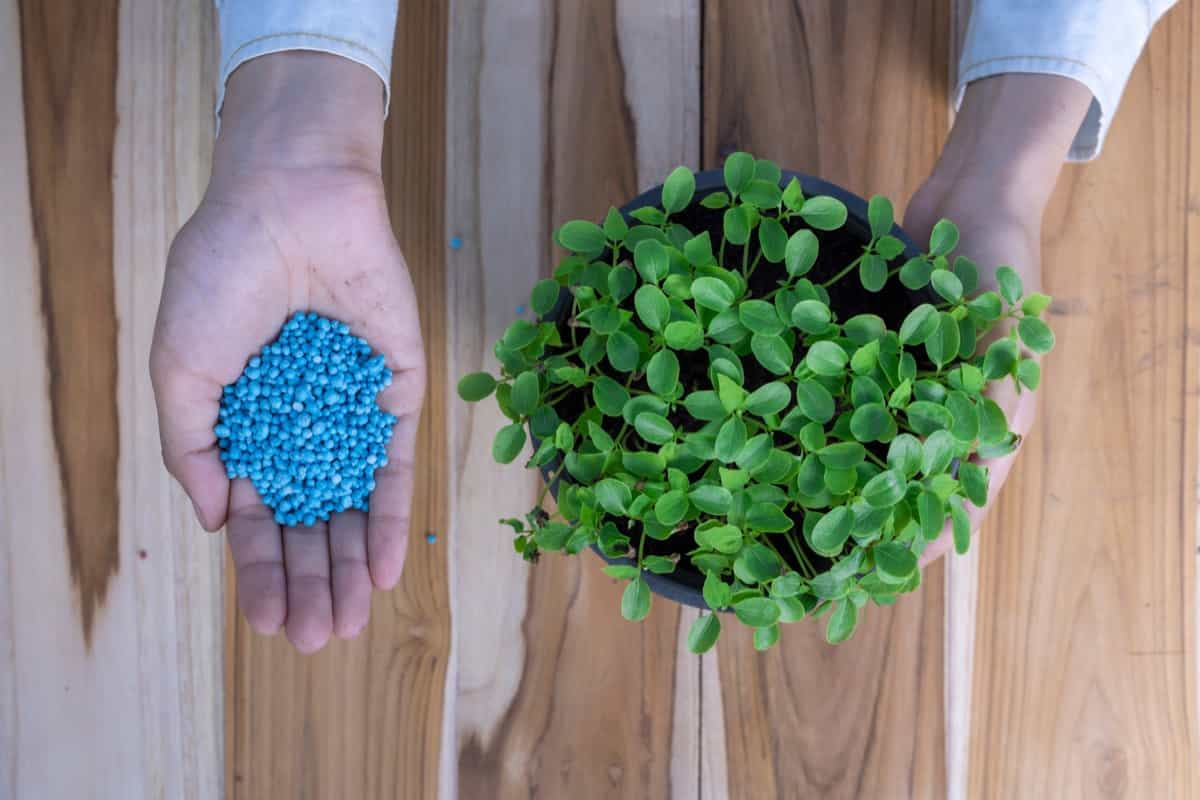
What’s the Best Fertilizer for Citrus Trees on a Terrace?
Two primary types, liquid and granulated, are available. Liquid fertilizers are convenient but can be more expensive, while slow-release granulated organic fertilizers provide season-long nourishment without frequent reapplication. The NPK ratio on the package, such as 7-10-12, represents the nutrient percentages per pound of product. Balanced ratios like 12-12-12 or 10-10-10 are ideal for most fruit trees.
Nitrogen (N) promotes green growth and photosynthesis, with a spring application recommended if growth is lacking. Phosphorus (P) aids in root and flower development. Potassium (K) supports water regulation in and around the tree’s cells. Jobe’s Company delivers a range of landscape and tree care products. Schultz Company provides grass seeds, plant food, and productive soil mixtures. FoxFarm Soil & Fertilizer Company has crafted professional-grade soil mixes and liquid plant foods since 1984.
Fertilizing Citrus trees is best done in winter and early spring, just before the growing season. Apply half-strength fertilizer for established trees in autumn. Limit nitrogen to 1 lb per year. If soil nitrogen levels are high, be cautious with additional sources like coffee grounds. Apple trees, like other fruit trees, benefit from high-nitrogen organic fertilizers. Eggshells can provide calcium and other minerals for robust cellular structure development.
Fertilizers for Flower Plants on Terrace
Ideally, opt for all-purpose fertilizers with balanced macronutrients, specifically nitrogen (N), phosphorus (P), and potassium (K), denoted as NPK ratios like 24-8-16 or 12-4-8. These ratios ensure optimal growth and flowering.
- Blossom Booster by Jack’s Classic (10-30-20): Suitable for indoor and outdoor use, it enhances bloom size, number, and color. Use it every 1-2 weeks during the active growth season.
- Water Soluble Bloom Booster by Miracle-Gro (15-30-15): Ideal for instant nutrition and increased blooms. Apply every 7-14 days, especially during recovery.
- Bud and Bloom Booster by Dr. Earth (3-9-4): An organic choice with natural ingredients. Suitable for all growth stages, including root and flower development.
- Super Bloom by Scotts (12-55-6): High in phosphorus, great for encouraging bursts of blooms. Reapply every 1-2 weeks.
- Rose and Flower Care by BioAdvanced: A 3-in-1 fertilizer, insect killer, and disease controller. Lasts for six weeks, ideal for various diseases.
- Neptune’s Harvest (2-6-4): Organic and budget-friendly. Enhances bloom volume and drought tolerance. Apply during bud formation and blooming.
- Proven Winners (24-12-17): Rich in nitrogen, perfect for young plants. Follow the provided application rates.
- Down to Earth Rose and Flower Mix (4-8-4): Suitable for roses and all flower types. Use when planting or during new growth.
Can I use the Same Fertilizer for all the flowers on My Terrace?
Yes, you can use the same all-purpose fertilizer for all the flowers on your terrace. Look for a balanced NPK fertilizer with ratios like 24-8-16 or 12-4-8, which provides essential nutrients (nitrogen, phosphorus, and potassium) needed for flowering. Such fertilizers suit various flower types and ensure healthy growth and vibrant blooms.
Fertilizers for Herbs
Fertilizing herb plants is essential for their health and vitality. The choice of fertilizer depends on whether you are growing herbs in the ground or in containers. For ground-planted herbs, homemade compost is an excellent option. Applying a 1″-2″ layer of compost around the plants in early spring and early fall acts as a nutrient-rich mulch. However, for herbs in containers, organic fertilizers are recommended.
In case you missed it: Weed Management in Cucumber Farming: Organic, Chemical, Cultural Control Methods
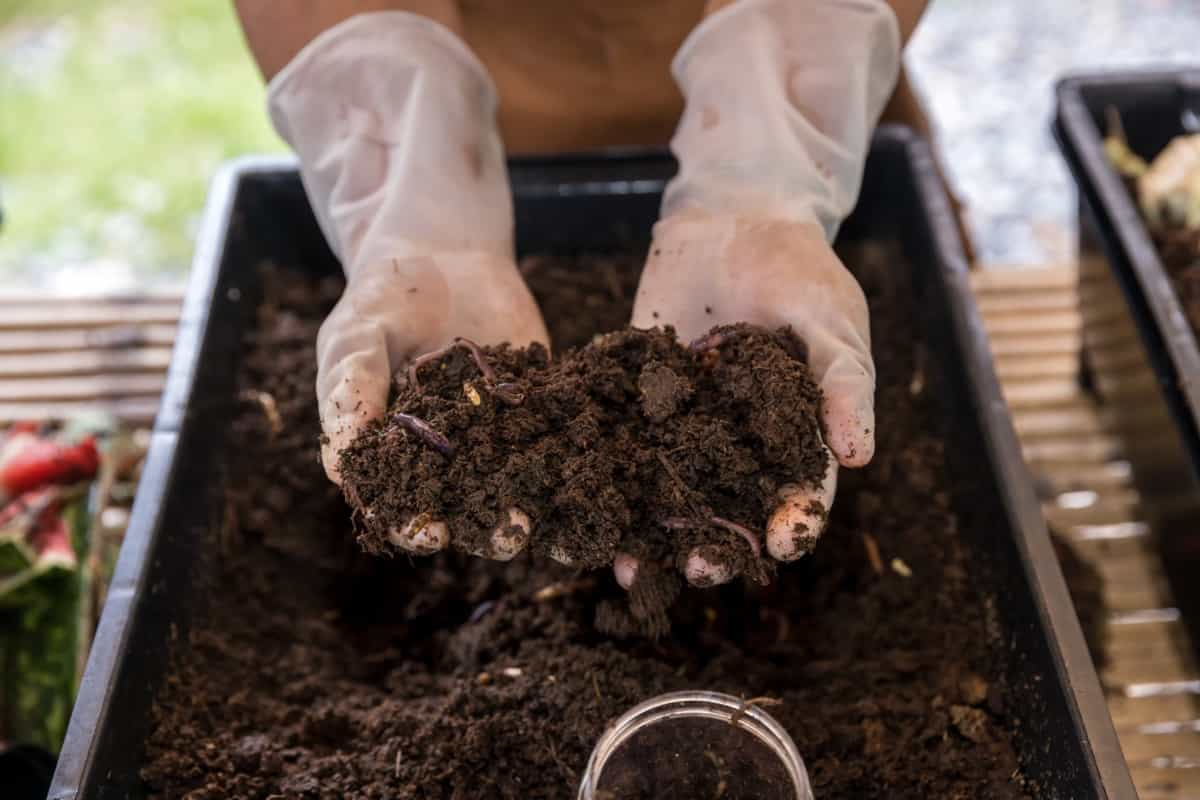
Some top choices include EarthPods Premium Herb Plant Organic Fertilizer Spikes, PRO Organic Plant Food by Shin Nong, and Joyful Dirt Premium Concentrated Organic Fertilizer. These products offer different methods of application and nutrient sources, catering to various herb-growing needs.
How can I Prevent Over-Fertilizing My Terrace Herbs?
To prevent over-fertilization of terrace herbs, follow the instructions carefully, use slow-release fertilizers, monitor soil nutrient levels, and observe plants for signs of stress. Follow a regular fertilizing schedule based on the type of fertilizer used, avoid impromptu feedings, and dilute liquid fertilizers to half-strength or as per the manufacturer’s recommendations. Organic mulch can help regulate soil nutrient levels and reduce the need for frequent fertilization. Regularly test your soil for nutrient deficiencies and monitor your plants for signs of stress.
Top 10 Organic Fertilizers for Terrace Garden Plants
- Organic Boost for Fruits, Flowers, and Veggies: A rapid-acting, OMRI-certified liquid fertilizer with a balanced NPK formula (3-3-5) sourced from organic fish and grain. Ensures quick nutrient absorption for robust plant growth.
- Organic Harvest Boost for Vegetables & Herbs: Formulated for leafy and warm-season crops, this environmentally safe fertilizer (3-4-4) contains Bio-tone for improved growth and is ideal for organic gardening.
- Organic Tomato & Veggie Fertilizer Mix: Perfect for tomatoes and vegetables, this blend includes organic materials like bat guano, kelp meal, and fish meal to enrich the soil and foster healthy plant development.
- Nutrient-Rich Veggie Boost: Catering to a range of vegetables and herbs, this 3-4-4 organic fertilizer is free from toxic ingredients, promoting sustainable gardening.
- Jobe’s Organics 09524 Purpose Granular Fertilizer, 16 Lb: OMRI-listed and certified organic, this granular fertilizer (4-4-4) contains Jobe’s Biozome, enhancing soil conditions and plant resistance to disease and drought.
- Organic Purple Cow Veggie Mix – Ready-to-Use Compost: An OMRI-listed compost-based mix ideal for container gardening, ensuring ample nutrients for healthy veggies.
- Espoma Garden-Tone: Organic 3-4-4 Fertilizer for Bumper Crops!: Versatile for leafy and warm-season crops, this 3-4-4 fertilizer promotes organic gardening while meeting quality standards.
- TRUE Organic – Liquid Tomato & Vegetable Food 16oz: A 3-2-3 liquid formula featuring high-quality ingredients for tomatoes, veggies, and herbs. Certified by CDFA and OMRI for organic gardening.
In case you missed it: How to Build a Shade Net House: DIY in Simple Steps from Scratch for Your Garden
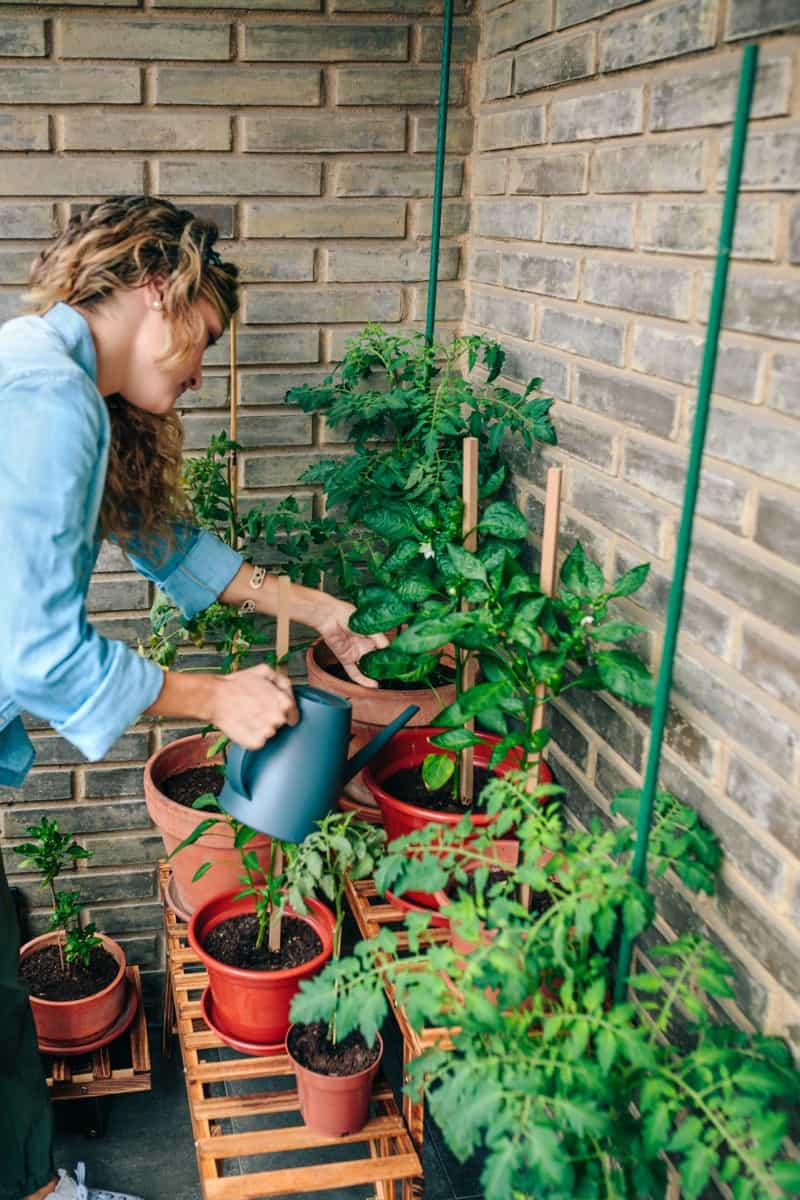
Conclusion
Choosing the best fertilizer for terrace plants is crucial for their health and productivity. The right organic fertilizer can enrich the soil, promote growth, and lead to abundant and thriving plants in your terrace garden, whether it’s vegetables, fruits, flowers, or herbs.



